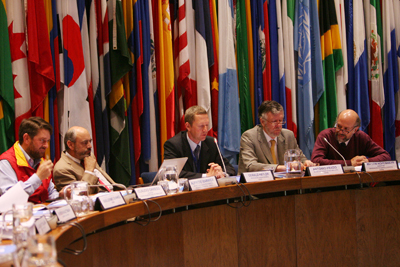Adopting New Technologies is Key to Reducing Inequality Gaps in the Region
Experts analyzed the contribution of information and communications technologies in the fields of education and health and their incorporation in social policies.

(20 October 2010) Information and communications technologies (ICTs) are changing society and their dissemination has become a vital tool for reducing inequality gaps in Latin American and Caribbean nations, said the Deputy Executive Secretary of ECLAC, Antonio Prado, during the inauguration of a seminar at Commission headquarters.
In the seminar Social Policies and the Information Society: Gaps, Opportunities and Rights, government officials and experts analyzed the contribution of ICTs to countries' social development, particularly in education and health, and how they can be incorporated in public policies.
The event, held at the headquarters of the Economic Commission for Latin America and the Caribbean (ECLAC) in Santiago, Chile, was organized by the Commission's Social Development Division with the support of the European Union through its cooperation initiative LIS.
"Latin America and the Caribbean have to make their best efforts to deepen and homogenize the expansion of ICTs in the public and private sphere in order to reduce inequality gaps," said Prado.
"Our document Time for Equality. Closing Gaps, Opening Trails - released this year during ECLAC's Thirty-third Session- asserts that technological change and the information society, or a society of knowledge; signal a true change of era. These innovations are changing styles of governing, production and trade patterns and ways of life and work," he added.
Gerald Hatler, First Secretary of the European Union's Delegation in Chile, said that ICTs play an essential role in improving people's lives and that is why it is so important to increase public access to Internet and broadband.
"With this, ICTs will also contribute to lower poverty and advance in the achievement of the Millennium Development Goals", he said.
Alfredo Barriga, Executive Secretary for Digital Development of the Government of Chile, stated that the society of knowledge is an economic resource that is forcing a change in the focus of public policies so they can aim at people's development.
"This is a new paradigm that we need to include in order for human capital to be at the centre of policies, because it is an indispensable factor of a country's competitiveness," said Barriga.
The conclusions of this seminar will be the basis for discussion at the Third Ministerial Conference on the Information Society in Latin America and the Caribbean to be held in Lima, Peru in November.
See also:
For more information, visit the webpage of ECLAC's Social Development Division.
For enquiries, please contact ECLAC's Public Information and Web Services Section.
Email: dpisantiago@cepal.org; telephone: (56-2) 210-2040
Related content
Seminario internacional "Las políticas sociales y la sociedad de la información: brechas, oportunidades y derechos"
Por Antonio Prado, Secretario Ejecutivo Adjunto de la CEPAL
Country(ies)
- Latin America and the Caribbean
-
Chile
Contact
Public Information Unit
- prensa@cepal.org
- (56 2) 2210 2040